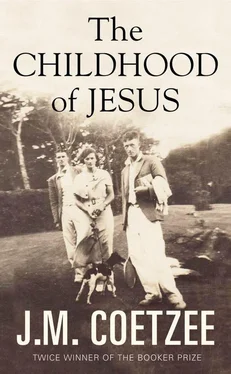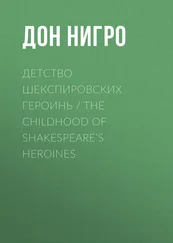‘There are boys there who smoke and drink and carry knives. It’s a school for criminals. If David goes back he will be scarred for life.’
The boy speaks. ‘What does that mean, scarred for life ?’
‘It’s just a way of speaking,’ says Inés. ‘It means the school will have a bad effect on you.’
‘Like a wound?’
‘Yes, like a wound.’
‘I’ve got lots of wounds already. I got them from the barbed wire. Do you want to see my wounds, Simón?’
‘Your mother meant something else. She means a wound to your soul. The kind of wound that does not heal. Is it true that boys at the school carry knives? Are you sure it isn’t just one boy?’
‘It’s lots of boys. And they’ve got a mother duck and ducklings and one of the boys trod on a duckling and its inside came out of its bum and I wanted to push them back but the teacher wouldn’t let me, he said I must let the duckling die, and I said I wanted to breathe into it, but he wouldn’t let me. And we had to do gardening. Every afternoon after school they made us dig. I hate digging.’
‘Digging is good for you. If no one were prepared to dig, we would have no crops, no food. Digging makes you strong. It gives you muscles.’
‘You can grow seeds on blotting paper. Our teacher showed us. You don’t need to dig.’
‘One or two seeds, yes. But if you want a proper crop, if you want to grow enough wheat to make bread and feed people, the seed has to go into the ground.’
‘I hate bread. Bread is boring. I like ice cream.’
‘I know you like ice cream. But you can’t live on ice cream, whereas you can live on bread.’
‘You can live on ice cream. Señor Daga does.’
‘Señor Daga just pretends to live on ice cream. In private I’m sure he eats bread like everyone else. Anyway, you shouldn’t take señor Daga as a model.’
‘Señor Daga gives me presents. You and Inés never give me presents.’
‘That’s untrue, my boy, untrue and unkind. Inés loves you and looks after you, and so do I. Whereas señor Daga, in his heart, has no love for you at all.’
‘He does love me! He wants me to come and live with him! He told Inés and Inés told me.’
‘I am sure she will never agree to that. You belong with your mother. That is what we have been struggling for all this time. Señor Daga may seem glamorous and exciting to you, but when you are older you will realize that glamorous, exciting people aren’t necessarily good people.’
‘What is glamorous?’
‘Glamorous means wearing earrings and carrying a knife.’
‘Señor Daga is in love with Inés. He is going to make babies in her tummy.’
‘David!’ Inés explodes.
‘It’s true! Inés said I mustn’t tell you, you will be jealous. Is it true, Simón? Are you jealous?’
‘No, of course I am not jealous. It is none of my business. What I am trying to tell you is that señor Daga is not a good person. He may invite you to his home and give you ice cream, but he doesn’t have your best interests at heart.’
‘What are my best interests?’
‘Your first interest is to grow up to be a good man. Like the good seed, the seed that goes deep into the earth and puts forth strong roots, and then when its time comes bursts forth into the light and bears manyfold. That is what you should be like. Like Don Quixote. Don Quixote rescued maidens. He protected the poor from the rich and powerful. Take him as your model, not señor Daga. Protect the poor. Save the oppressed. And honour your mother.’
‘No! My mother must honour me! Anyway, señor Daga says Don Quixote is old-fashioned. He says no one rides a horse any more.’
‘Well, if you wanted to you could easily prove him wrong. Mount your horse and raise your sword on high. That will silence señor Daga. Mount El Rey.’
‘El Rey is dead.’
‘No, he is not. El Rey lives. You know that.’
‘Where?’ the boy whispers. His eyes suddenly fill with tears, his lips quiver, he can barely bring out the word.
‘I don’t know, but somewhere El Rey is waiting for you to come. If you will search you will be sure to find him.’
It is the day of his discharge from hospital. He says his goodbyes to the nurses. To Clara he says: ‘I will not easily forget your care. I would like to believe there was more than just goodwill behind it.’ Clara does not answer; but from the direct look she gives him he knows he is right.
The hospital has set aside a car and driver to convey him to his new home in the West Blocks; Eugenio has offered to accompany him and see that he is safely settled in. Once they are on the road, however, he asks the driver to make a detour past the East Blocks.
‘I can’t do that,’ replies the driver. ‘It’s outside my commission.’
‘Please,’ he says. ‘I need to pick up some clothes. I will be only five minutes.’
Grudgingly the driver consents.
‘You mentioned difficulties you have been having with your youngster’s schooling,’ says Eugenio as they take the turn-off to the east. ‘What difficulties are those?’
‘The school authorities want to take him away from us. By force, if necessary. They want to send him back to Punto Arenas.’
‘To Punto Arenas! Why?’
‘Because they have built a school in Punto Arenas especially for children who are bored with stories about Juan and María and what they did at the seaside. Who are bored and show their boredom. Children who won’t obey the rules for addition and subtraction laid down by their class teacher. The man-made rules. Two plus two equalling four and so forth.’
‘That’s bad. But why won’t your boy do sums the way his teacher tells him?’
‘Why should he, when a voice inside him says the teacher’s way is not the true way?’
‘I don’t follow. If the rules are true for you and for me and for everyone else, how can they not be true for him? And why do you call them man-made rules?’
‘Because two and two could just as well equal three or five or ninety-nine if we so decided.’
‘But two and two do equal four. Unless you give some strange, special meaning to equal . You can count it off for yourself: one two three four . If two and two really equalled three then everything would collapse into chaos. We would be in another universe, with other physical laws. In the existing universe two and two equal four. It is a universal rule, independent of us, not man-made at all. Even if you and I were to cease to be, two and two would go on equalling four.’
‘Yes, but which two and which two make four? Most of the time, Eugenio, I think the child simply doesn’t understand numbers, the way a cat or dog doesn’t understand them. But now and then I have to ask myself: Is there anyone on earth to whom numbers are more real?
‘While I was in hospital with nothing else to do, I tried, as a mental exercise, to see the world through David’s eyes. Put an apple before him and what does he see? An apple: not one apple, just an apple. Put two apples before him. What does he see? An apple and an apple: not two apples, not the same apple twice, just an apple and an apple. Now along comes señor León (señor León is his class teacher) and demands: How many apples, child? What is the answer? What are apples ? What is the singular of which apples is the plural? Three men in a car heading for the East Blocks: who is the singular of which men is the plural — Eugenio or Simón or our friend the driver whose name I don’t know? Are we three, or are we one and one and one?
‘You throw up your hands in exasperation, and I can see why. One and one and one make three, you say, and I am bound to agree. Three men in a car: simple. But David won’t follow us. He won’t take the steps we take when we count: one step two step three . It is as if the numbers were islands floating in a great black sea of nothingness, and he were each time being asked to close his eyes and launch himself across the void. What if I fall? — that is what he asks himself. What if I fall and then keep falling for ever? Lying in bed in the middle of the night, I could sometimes swear that I too was falling — falling under the same spell that grips the boy. If getting from one to two is so hard , I asked myself, how shall I ever get from zero to one? From nowhere to somewhere: it seemed to demand a miracle each time.’
Читать дальше












